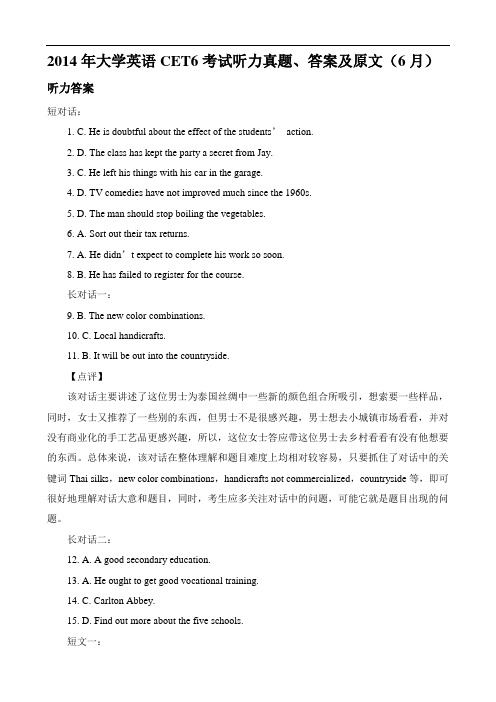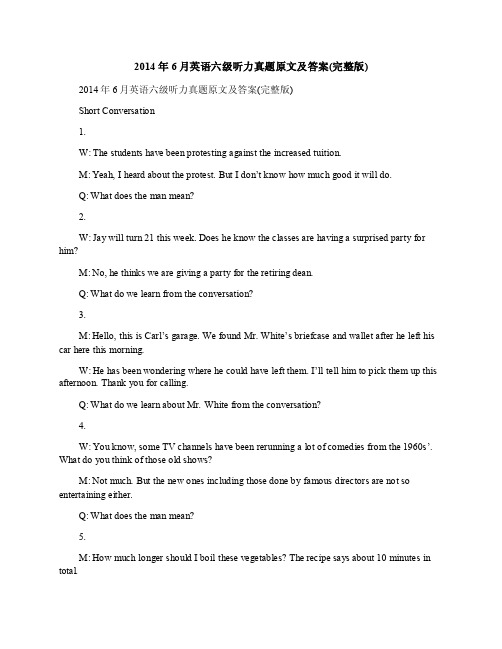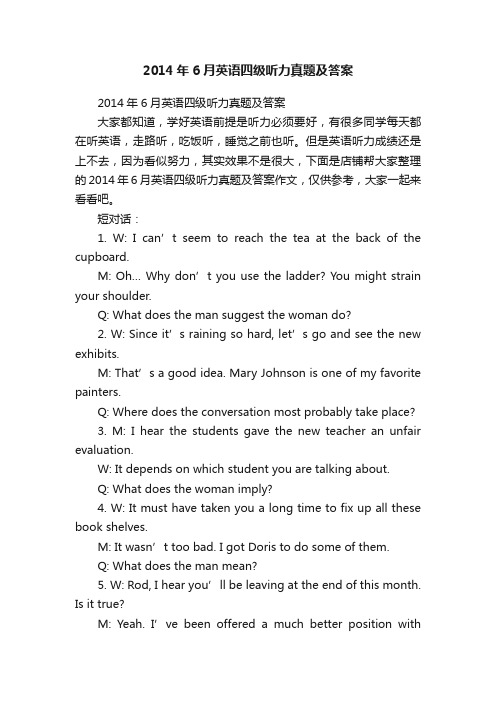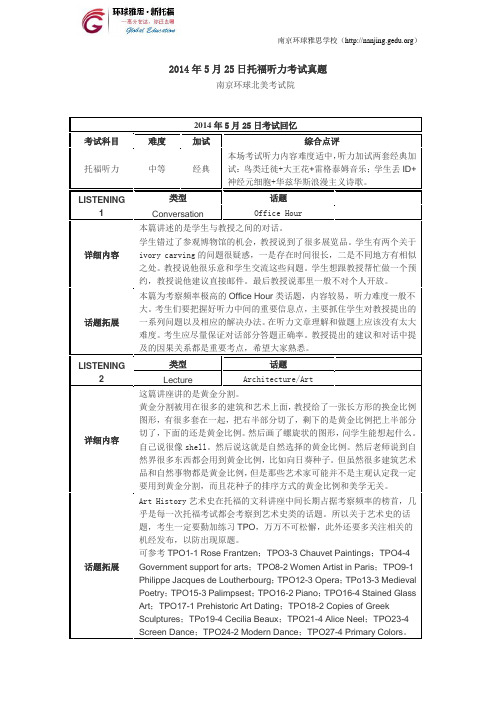2014年6月15日托福听力真题及答案解析
2014年大学英语CET6真题听力、答案及原文(6月)

2014年大学英语CET6考试听力真题、答案及原文(6月)听力答案短对话:1. C. He is doubtful about the effect of the students’action.2. D. The class has kept the party a secret from Jay.3. C. He left his things with his car in the garage.4. D. TV comedies have not improved much since the 1960s.5. D. The man should stop boiling the vegetables.6. A. Sort out their tax returns.7. A. He didn’t expect to complete his work so soon.8. B. He has failed to register for the course.长对话一:9. B. The new color combinations.10. C. Local handicrafts.11. B. It will be out into the countryside.【点评】该对话主要讲述了这位男士为泰国丝绸中一些新的颜色组合所吸引,想索要一些样品,同时,女士又推荐了一些别的东西,但男士不是很感兴趣,男士想去小城镇市场看看,并对没有商业化的手工艺品更感兴趣,所以,这位女士答应带这位男士去乡村看看有没有他想要的东西。
总体来说,该对话在整体理解和题目难度上均相对较容易,只要抓住了对话中的关键词Thai silks,new color combinations,handicrafts not commercialized,countryside等,即可很好地理解对话大意和题目,同时,考生应多关注对话中的问题,可能它就是题目出现的问题。
2014年6月英语六级听力真题原文及答案(完整版).docx

2014年6月英语六级听力真题原文及答案(完整版) 2014年6月英语六级听力真题原文及答案(完整版)Short Conversation1.W: The students have been protesting against the increased tuition.M: Yeah, I heard about the protest. But I don’t know how much good it will do.Q: What does the man mean?2.W: Jay will turn 21 this week. Does he know the classes are having a surprised party for him?M: No, he thinks we are giving a party for the retiring dean.Q: What do we learn from the conversation?3.M: Hello, this is Carl’s garage. We found Mr. White’s briefcase and wallet after he left his car here this morning.W: He has been wondering where he could have left them. I’ll tell him to pick them up this afternoon. Thank you for calling.Q: What do we learn about Mr. White from the conversation?4.W: You know, some TV channels have been rerunning a lot of comedies from the 1960s’. What do you think of those old shows?M: Not much. But the new ones including those done by famous directors are not so entertaining either.Q: What does the man mean?5.M: How much longer should I boil these vegetables? The recipe says about 10 minutes in total.W: They look pretty done to me. I doubt you should cook them anymore.Q: What does the woman mean?6.W: Tom, are you going to your parents’ house tonight?M: Yes, I promise to help them figure out their tax returns. The tax code is really confusing to them.Q: What is the man going to do for his parents?7.W: I was surprised when I heard you’d finished your research project a whole month early.M: How I manage to do it’s still a mystery to me.Q: What does the man mean?8.W:I was hoping we could be in the same developmental psychology class.M:Me too, but by the time I went for registration the course was closed.Q: What does the man mean?【点评】本次六级考试的难度与往年持平,继续延续在六级考试中,出现大量推理判断题,即提问方式为:What does the man / woman mean? 这样的题目。
2014年6月英语四级听力真题及答案

2014年6月英语四级听力真题及答案2014年6月英语四级听力真题及答案大家都知道,学好英语前提是听力必须要好,有很多同学每天都在听英语,走路听,吃饭听,睡觉之前也听。
但是英语听力成绩还是上不去,因为看似努力,其实效果不是很大,下面是店铺帮大家整理的2014年6月英语四级听力真题及答案作文,仅供参考,大家一起来看看吧。
短对话:1. W: I can’t seem to reach the tea at the back of the cupboard.M: Oh… Why don’t you use the ladder? You might strain your shoulder.Q: What does the man suggest the woman do?2. W: Since it’s raining so hard, let’s go and see the new exhibits.M: That’s a good idea. M ary Johnson is one of my favorite painters.Q: Where does the conversation most probably take place?3. M: I hear the students gave the new teacher an unfair evaluation.W: It depends on which student you are talking about.Q: What does the woman imply?4. W: It must have taken you a long time to fix up all these book shelves.M: It wasn’t too bad. I got Doris to do some of them.Q: What does the man mean?5. W: Rod, I hear you’ll be leaving at the end of this month. Is it true?M: Yeah. I’ve been offered a much better position withanother firm. I’d be a fool to turn it down.Q: Why is the man quitting his job?6. W: I honestly don’t want to continue the gardening tomorrow, Tony?M: Neither do I. But I think we should get it over with this weekend.Q: What does the man mean?7. W: You’ve already furnished your apartment?M: I found some used furniture that was dirt cheap.Q: What do we learn from the conversation?8. W: Has the mechanic called the bus repairers?M: Not yet .I’ll let you know when he calls.Q: What do we learn from the conversation?长对话:Questions 9 to 11 are based on the conversation you have just heard.Conversation one:M: Hello. Matt Ellis speaking.W: Hello, Dr. Ellis, my name’s Pan Johnson. My roommate, Janet Holmes, wanted me to call you.M: Janet Holmes? Oh, that’s right. She’s in my Shakespearean English class. Has anything happened to her?W: Nothing, it’s just that she submitted a job application yesterday and the company asked her in for an interview today. She’s afraid she won’t be able to attend your class this afternoon though. I’m calling to see whether it would be OK if I gave you her essay. Janet said it’s due today.M: Certainly, that would be fine. Uh, you can either drop it off at my class or bring it to my office.W: Would it be all right to come by your office around 4:00?I’m afraid I can’t come any earlier because I have three classes this afternoon.M: Uh, I won’t be here when you come. I’m supposed to be at a meeting from 3:00 to 6:00, but how about leaving it with my secretary? She usually stays until 5:00. W: Fine, please tell her I’ll be there at 4:00. And Dr. Ellis, one more thing, could you tell me where your office is? Janet told me where your class is, but she didn’t give me directions to your office.M: Well, I’m in Room 302 of the Gregory Building. I’ll tell my secretary to put the paper in my mail box, and I’ll get it when I return.W: I sure appreciate it. Goodbye, Dr. Ellis.M: Goodbye, Ms. Johnson.Questions 9 to 11 are based on the conversation you have just heard.9. Why couldn’t the woman’s roommate attend the Shakespearean English class that afternoon?10. What favor is the woman going to do for her roommate?11. What does the woman want to know at the end of the conversation?Conversation 2:W: How are things going, Roald?M: Not bad, Jane. I’m involved in several projects and it’s a long working day. But I’m used to that so it doesn’t bother me too much.W: I heard you have moved to a new house in the suburb. How do you like commuting to London every da y? Don’t you find it a string?M: It was terrible at first, especially getting up before dawn to catch that 6:30 train. But it’s bearable now that I’ m used toit.W: Don’t you think it’s an awful waste of time? I couldn’t bear to spend three hours sitting in a train every day.M: I used to feel the same as you. But now I quite enjoy it.W: How do you pass the time? Do you bring some work with you to do on the train?M: Ah, that’s a good question. In the morning, I just sit in comfort and read the papers to catch up with the news. On the way home at night, I relax with a good book or chat with friends or even have a game of bridge.W: I suppose you know lots of people on the train now.。
2014年5月25日托福听力考试解析

2014年5月25日托福听力考试真题南京环球北美考试院2014年5月25日考试回忆考试科目难度加试综合点评托福听力中等经典本场考试听力内容难度适中,听力加试两套经典加试:鸟类迁徙+大王花+雷格泰姆音乐;学生丢ID+神经元细胞+华兹华斯浪漫主义诗歌。
LISTENING1类型话题Conversation Office Hour详细内容本篇讲述的是学生与教授之间的对话。
学生错过了参观博物馆的机会,教授说到了很多展览品。
学生有两个关于ivory carving的问题很疑惑,一是存在时间很长,二是不同地方有相似之处。
教授说他很乐意和学生交流这些问题。
学生想跟教授帮忙做一个预约,教授说他建议直接邮件。
最后教授说那里一般不对个人开放。
话题拓展本篇为考察频率极高的Office Hour类话题,内容较易,听力难度一般不大。
考生们要把握好听力中间的重要信息点,主要抓住学生对教授提出的一系列问题以及相应的解决办法。
在听力文章理解和做题上应该没有太大难度。
考生应尽量保证对话部分答题正确率。
教授提出的建议和对话中提及的因果关系都是重要考点,希望大家熟悉。
LISTENING2类型话题Lecture Architecture/Art详细内容这篇讲座讲的是黄金分割。
黄金分割被用在很多的建筑和艺术上面,教授给了一张长方形的换金比例图形,有很多套在一起,把右半部分切了,剩下的是黄金比例把上半部分切了,下面的还是黄金比例。
然后画了螺旋状的图形,问学生能想起什么。
自己说很像shell。
然后说这就是自然选择的黄金比例。
然后老师说到自然界很多东西都会用到黄金比例,比如向日葵种子。
但虽然很多建筑艺术品和自然事物都是黄金比例,但是那些艺术家可能并不是主观认定我一定要用到黄金分割,而且花种子的排序方式的黄金比例和美学无关。
话题拓展Art History艺术史在托福的文科讲座中间长期占据考察频率的榜首,几乎是每一次托福考试都会考察到艺术史类的话题。
2014年英语试题答案及听力原文

英语试题参考答案及评分说明第I 卷(选择题共75 分)一至四题(一)参考答案:1—5 BABAC 6—10 BCBCA 11—15 BCACA 16—20 ABCBC21—25 CABDC 26—30 ABDCB 31—35 BADBA 36—40 DCDAC41—45 BACBD 46—50 BCCAB 51—55 DCDCB 56—60 DABAC(二)评分说明:1. 1—45小题,每小题1分;46—60小题,每小题2分;2. 凡与答案不符者, 不得分。
第II 卷(非选择题共45分)五、词汇运用(一)参考答案:61. fifth 62. broke 63. health 64. hardly 65. winner 66. smells 67. besides68. normal 69. polluting 70. population71. asked 72. so 73. greatly 74. stronger 75. during 76. takes 77. sad 78. calling79. countries 80. themselves(二)评分说明:1. 本题共20分,每小题1分;2. 61—70小题凡与答案不符者,不得分; 71—80小题单词选对词形用错,减半计分。
六、阅读表达(一)参考答案:81. It means saying or doing something to stop feeling shy or uncomfortable around someone you don’t knowwell.82. Four.83. 尽力看到生活中光明的一面, 对一切事情持积极乐观的态度。
84. Be a good listener. / Develop listening skills.85. Breaking the Ice(二)评分说明:1. 本题共5分,每小题1分;2. 虽与参考答案表达方式不同但意思一致,无语言错误,即可得分;83小题只翻译出“积极地”,不得分。
托福听力tpo50 全套对话讲座原文+题目+答案+译文

托福听力tpo50全套对话讲座原文+题目+答案+译文Section1 (2)Conversation1 (2)原文 (2)题目 (4)答案 (5)译文 (5)Lecture1 (7)原文 (7)题目 (9)答案 (11)译文 (11)Lecture2 (13)原文 (13)题目 (15)答案 (17)译文 (18)Section2 (19)Conversation2 (19)原文 (19)题目 (21)答案 (23)译文 (23)Lecture3 (25)原文 (25)题目 (27)答案 (29)译文 (29)Lecture4 (31)原文 (31)题目 (33)答案 (35)译文 (36)Section1Conversation1原文NARRATOR:Listen to a conversation between a student and a political science professor.MALE STUDENT:I’m not sure if you know,but I was elected to student government this year…FEMALE PROFESSOR:Oh,congratulations!I was in student government myself as an undergraduate.It taught me a lot about the political process.In fact,the experience solved my problem of what to do with my life—it really cemented my interest in becoming a political scientist.MALE STUDENT:Cool.Anyway,um,the reason I came by is,we’re getting ready to conduct a straw poll on campus.You know,hold an informal vote,since the general election’s just a couple months away.We wanna get a feel for the student body’s political leanings.Like,who students are planning to vote for,which political party people identify with,that sorta thing.FEMALE PROFESSOR:Oh sure.I helped students run a straw poll once,years ago.It was a lotta work,mostly because we used paper ballots and stayed up all night counting‘em.But if you use computers.MALE STUDENT:Yeah,we’re creating a Web site for it where students’ll be able to vote online.Um,and we’re looking for a faculty advisor to help,actually.I was hoping you might be rested.FEMALE PROFESSOR:Oh,I’m flattered,John,but my schedule’s so jammed.I’m teaching two seminars,your intro course,finishing up my research…But,uh,what about Professor Klein?She’s new in our department.Plus,she’s a whiz with computers.MALE STUDENT:OK.I’ll ask her.FEMALE PROFESSOR:So,have you decided on a topic for your term paper yet?MALE STUDENT:Not really.FEMALE PROFESSOR:Why not write about your straw poll?Since the paper’s not due till after the election,you could include your results,maybe compare them with the real election results?MALE STUDENT:But would that be enough?I mean,just comparing numbers?FEMALE PROFESSOR:Well,no,you’d need to provide some analysis,too.But I was thinking—there’s a couple of local ballot questions this year,ya know,referenda that voters can either support or not support.MALE STUDENT:Right,there’s one on whether to ban smoking in restaurants,and another one,uh…I think it’s whether to spend tax dollars for a new sports arena in the city.FEMALE PROFESSOR:OK,here’s an idea…In regular elections,the vast majority of voters ignore referenda;they vote for their favorite candidates,but avoid ballot questions.We believe it’s because voters aren’t familiar with the questions or don’t understand them.But actively educating people on ballot questions right before they vote can improve referendum participation rates.MALE STUDENT:In that case,maybe we could have our straw-poll Web site provide information on the ballot questions,like how each proposal would affect students.FEMALE PROFESSOR:Exactly.And when you write your paper,you could compare the students’referendum voting rate to the general public’s,and include your own analysis of the results.Plus there’s plenty of published research on referendum voting behavior.MALE STUDENT:Thanks Professor Miller!I had no idea this straw poll could actually help me in my course work.题目1.Why does the man go to see the professor?A.To suggest an idea for his research projectB.To tell her about his election to student governmentC.To ask for her help on a political projectD.To discuss methods of gathering public opinion2.What is the professor's attitude toward her involvement in student government as an undergraduate?A.She is grateful that the experience helped inspire her career choice.B.She regrets that her involvement took time away from her studies.C.She wishes that she had been more active than she was.D.She is glad that her involvement enabled her to help other students.3.What is the student government's main reason for conducting a straw poll?A.To educate students on the candidates'positionsB.To remind students to vote in the upcoming electionC.To find out how students feel about the local referendaD.To get an idea of students'political preferences4.Why does the professor mention paper ballots?A.To show how a straw poll differs from an actual electionB.To stress the importance of keeping accurate recordsC.To indicate that conducting a poll may present challengesD.To suggest a way to improve communication between the student body and the student government5.Why does the professor discuss voting behavior on referenda?A.To encourage the man to vote on the local referendaB.To help the man develop a focus for his term paperC.To express her skepticism that voting behavior can be changedD.To let the man know about her current research project答案C AD C B译文旁白:请听一段学生和政治学教授之间的对话。
2014年6月英语四级听力真题及答案(2)
2014年6月英语四级听力真题及答案(2)2014年6月英语四级听力真题及答案M: Yes, I bumped into someone I know on the platform every day. Last week I came across a couple of old school friends and we spend the entire journey in the bar.W: It sounds like a good club. You never know. I may join it too.Questions 12 to 15 are based on the conversation you have just heard.12. What does the man say about his job?13. Which train does the man take to work every day?14. How does the man feel about commuting to work every day now?15. How does the man spend his time on the morning train?短文一Passage OneMost American college students need to be efficient readers. This is necessary because full-time students probably have to read several hundred pages every week. They dont have time to read a chapter three or four times. They need to extract as much information as possible from the first or second reading.An extraordinarily important study skill is knowing how to mark a book. Students mark the main ideas and important details with a pen or pencil, yellow or blue or orange. Some students mark new vocabulary in a different color. Most students write questions or short notes in the margins. Marking a book is a useful skill, but its important to do it right. First, read a chapter with one pen in your hand and others next to you on the desk. Second, read a whole paragraph before you mark anything. Dontmark too much. Usually you will mark about 10% of a passage. Third, decide on your own system for marking. For example, maybe you will mark main ideas in yellow, important details in blue and new words in orange. Maybe you will put question marks in the margin when you dont understand something and before an exam. Instead, you just need to review your marks and you can save a lot of time.16. What should American college students do to cope with their heavy reading assignments?17. What suggestion does the speaker give about marking a textbook?18. How should students prepare for an exam according to the speaker?短文二:Passage TwoThe thought of having no sleep for 24 hours or more isnt a pleasant one for most people. The amount of sleep that each person needs varies. In general, each of us needs about 8 hours of sleep each day to keep us healthy and happy. Some people, however, can get by with just a few hours of sleep at night.It doesnt matter when or how much a person sleeps. But everyone needs some rest to stay alive. Few doctors would have thought that there might be an exception to this. Sleep is, after all, a very basic need. But a man named Al Herpin turned out to be a real exception, for supposedly, he never slept!Al Herpin was 90 years old when doctors came to his home in New Jersy. They hoped to challenge the claim that he never slept. But they were surprised. Though they watched him every hour of the day, they never saw Herpin sleeping. He did not even own a bed. He never needed one.The closest that Herpin came to resting was to sit in a rocking chair and read a half dozen newspapers. His doctors were puzzled by the strange case of permanent sleeplessness. Herpin offered the only clue to his condition. He remembered some talk about his mother having been injured several days before he had been born. Herpin died at the age of 94, never, it seems, having slept at all.19. What is taken for granted by most people?20. What do doctors think of Al Herpins case?21. What could have accounted for Al Herpins sleeplessness?短文三:Passage ThreeHetty Green was a very spoiled, only child. She was born in Massachusetts USA in 1835. Her father was a millionaire businessman. Her mother was often ill, and so from the age of two her father took her with him to work and taught her about stocks and shares. At the age of six she started reading the daily financial newspapers and opened her own bank account. Her father died when she was 21 and she inherited 7.5 million dollars. She went to New York and invested on Wall Street. Hetty saved every penny, eating in the cheapest restaurants for 15 cents. She became one of the richest and most hated women in the world. At 33 she married Edward Green, a multi-millionaire, and had two children, Ned and Sylvia.Hetty’s meanness was well-known. She always argued about prices in shops. She walked to the local grocery store to buy broken biscuits which were much cheaper, and to get a free bone for her much loved dog. Once she lost a two-cent stamp and spent the night looking for it. She never bought clothes and always wore the same long, ragged black skirt. Worst of all, whenher son, Ned, fell and injured his knee, she refused to pay for a doctor and spent hours looking for free medical help. In the end Ned lost his leg. When she died in 1916 she left her children 100 million dollars. Her daughter built a hospital with her money.下载文档润稿写作咨询。
2014年6月四级英语听力真题答案
★⽆忧考英语听⼒频道为⼤家整理的2014年6⽉四级英语听⼒真题答案,供⼤家参考。
更多阅读请查看本站频道。
Part Ⅰ Writing The First Place I Will Show in My Hometown—the Central Avenue My hometown is Harbin. The most interesting place which I would like to take my foreign friends to is the Central Avenue, if they come to my hometown. The reasons for this can be illustrated as below. To begin with, as the symbol of Harbin, the Central Avenue not only has a long history, but also a famous food palace. There are a variety of delicious foods for you to choose. Just take the ice-cream brick of Ma Dieer as an example. Many of tourists to the Central Avenue sing their praises for the ice-cream brick of Ma Dieer. In addition, the brilliant historic culture of the Central Avenue can widen people’s vision and enhance their knowledge, which lays a solid foundation for the understanding of this fabulous city—Harbin. I believe my foreign friends will enjoy themselves in the Central Avenue. Not only can they appreciate the wonderful landscape of Harbin but also taste authentic northeast food. No better place can be chosen than the Central Avenue! Part Ⅱ Listening Comprehension 1-5: BDDCD 6-10: ADBAC 11-15: ACBCA 16-20: DABDC 20-25: BCDAB 26. identical 27. approach 28. back and forth 29. opposite 30. indicates 31. referring to 32. parallel to 33. reserved 34. at the right angle 35. embarrassingPart III Reading Comprehension Section A 36. melted 37. line 38. contributing 39. ranging 40. dramatic 41. impact 42. appealing 43. average 44. maintain 45. recently Section B 46. C Physical books will surely become much rarer in the marketplace…. 47. N Books—especially books the average… 48. J Nor did TV kill radio… 49. H Sometimes a new technology doesn’t… 50. A Amazon, by far the largest… 51. L Sometimes old technology lingers for… 52. B Does this spell the doom of the …. 53. F One technology replaces another only… 54. C Physical books will surely become much rather… 55. M Then there is the fireplace… Section C 56. B The humanities and STEM subjects should be given equal importance. 57. D Their chances of getting a good job. 58. A They benefit students in their future life. 59. D Those who have received a well-rounded education. 60. C Prepare themselves for different job options. 61. A It sounds very attractive. 62. D They cause serious damage to the environment. 63. C It wants to keep its own environment intact. 64. B It improves economic efficiency. 65. A To justify America's dependence on oil imports. Part IV Translation In order to promote equality in education, China has invested 36 billion Yuan to improve educational facilities in rural areas and strengthen rural compulsory education in Midwest areas. These funds are used to improve teaching facilities, and purchase books, benefiting more than 160,000 primary and secondary schools. Funds are used to purchase musical instrument and painting tools as well. Now children in rural and mountainous areas can have music and painting lessons as children from coastal cities do. Some students who has transferred to city schools to receive a better education are now moving back to their local rural schools.。
20141206托福考试听力题回顾_图文
朗阁海外考试研究中心Research Academy for Foreign Language Examinations 新托福听力考题回顾朗阁海外考试研究中心陈荣华考试日期(A 卷)是否加考是场景话题内容描述考题回忆Listening 1 学术类对话女生还没有选定专业,教授建议她选art history。
女生说她很有兴趣,但是这个专业太专,不够广泛;同时她的兴趣其实来自于古希腊神话,art 中有很多描述这个的。
教授说你可以interdisciplinary 学习=文学+希腊语+很多学生还不知道这些,女生听了之后很高兴,教授最后说还要学习拉丁语。
Listening 2 物理学物理课老师讲fluid (流体),说fluid 包括gas 和liquid, 顺便讲了两幅画。
第一幅是颜料流动;第二幅是卫星拍摄的山脉照片,云霄在山峰上形成漩涡,叫street 。
但是Karman 不是第一个发现这个的人,很早以前达芬奇就有一幅画里面有这个。
Listening 3 建筑学一般建筑是先出设计再计算energy consumption之类的,但是有一个特殊的建筑是先有很详细的energyconsumption 的要求,然后再根据它们进行设计。
然后讲这个建筑建成后完全不需要电力提供,自己就可以支持自己。
然后讲了一些设计的细节,比如形状(很像H 型)是为了一方面太阳能面积大(有题),另一方面是让阳光最大程度上的被利用,穿透整个建筑。
还有它们的windows, 学生问这么多windows 让阳光进来,但是window 不是很浪费能量吗,因为阻止吸收什么的(有题)教授说这种window 特别高端,不是那种一般的multiple layers with gas in between, 而是让air conducted, 像线粒体的结构一样用来使楼里的温度constant 。
Listening 4 生活类对话女生和coffee shop老板的对话。
2014年6月英语四级考试真题及答案:听力
Part II Listening Comprehension (30 minutes)Section ADirections: In this section, you will hear 8 short conversations and 2 long conversations. At the end of each conversation, one or more questions will be asked about what was said. Both the conversation and the questions will be spoken only once. After each question there will be a pause. During the pause, you must read the four choices marked A), B), C) and D), and decide which is the best answer. Then mark the corresponding letter on Answer Sheet 1 with a single line through the centre.注意:此部分试题请在答题卡1上作答。
1. A) See a doctor about her strained shoulder.B) Use a ladder to help her reach the tea.C) Replace the cupboard with a new one.D) Place the tea on a lower shelf next time.2. A) At Mary Johnson’s. C) In an exhibition hall.B) At a painter’s studio. D) Outside an art gallery.3. A) The teacher evaluated lacks teaching experience.B) She does not quite agree with what the man said.C) The man had better talk with the students himself.D) New students usually cannot offer a fair evaluation.4. A) He helped Doris build up the furniture.B) Doris helped him arrange the furniture.C) Doris fixed up some of the bookshelves.D) He was good at assembling bookshelves.5. A) He doesn’t get on with the others. C) He has been taken for a fool.B) He doesn’t feel at ease in the firm. D) He has found a better position.6. A) They should finish the work as soon as possible.B) He will continue to work in the garden himself.C) He is tired of doing gardening on weekends.D) They can hire a gardener to do the work.7. A) The man has to get rid of the used furniture.B) The man’s apartment is ready for rent.C) The furniture is covered with lots of dust.D) The furniture the man bought is inexpensive.8. A) The man will give the mechanic a call.B) The woman is waiting for a call.C) The woman is doing some repairs.D) The man knows the mechanic very well.Questions 9 to 11 are based on the conversation you have just heard.9. A) She had a job interview to attend.B) She was busy finishing her project.C) She had to attend an important meeting.D) She was in the middle of writing an essay.10. A) Accompany her roommate to the classroom.B) Hand in her roommate’s application form.C) Submit her roommate’s assignment.D) Help her roommate with her report.11. A) Where Dr. Ellis’s office is located. C) Directions to the classroom building.B) When Dr. Ellis leaves his office. D) Dr. Ellis’s schedule for the afternoon.Questions 12 to 15 are based on the conversation you have just heard.12. A) He finds it rather stressful. C) He can handle it quite well.B) He is thinking of quitting it. D) He has to work extra hours.13. A) The 6:00 one. C) The 7:00 one.B) The 6:30 one. D) The 7:30 one.14. A) It is an awful waste of time.B) He finds it rather unbearable.C) The time on the train is enjoyable.D) It is something difficult to get used to.15. A) Reading newspapers. C) Listening to the daily news.B) Chatting with friends. D) Planning the day’s work.Section BDirections: In this section, you will hear 3 short passages. At the end of each passage, you will hear some questions. Both the passage and the questions will be spoken only once. After you hear a question, you must choose the best answer from the four choices marked A), B), C) and D). Then mark the corresponding letter on Answer Sheet 1 with a single line through the centre.注意:此部分试题请在答题卡1上作答。
